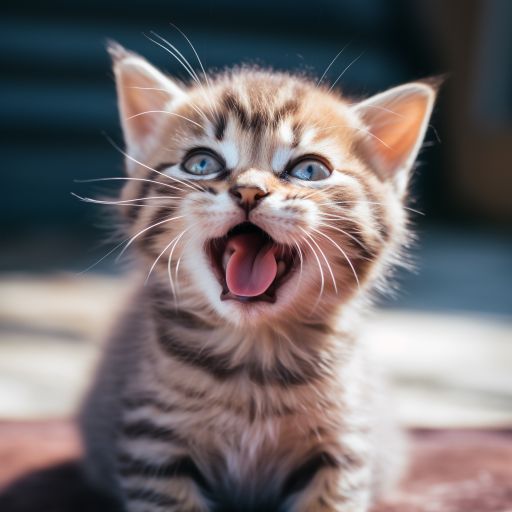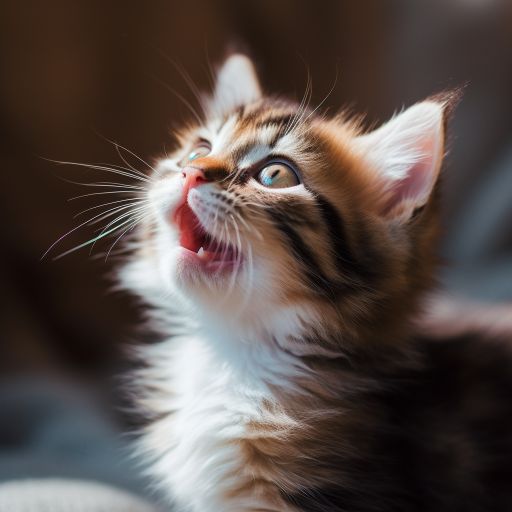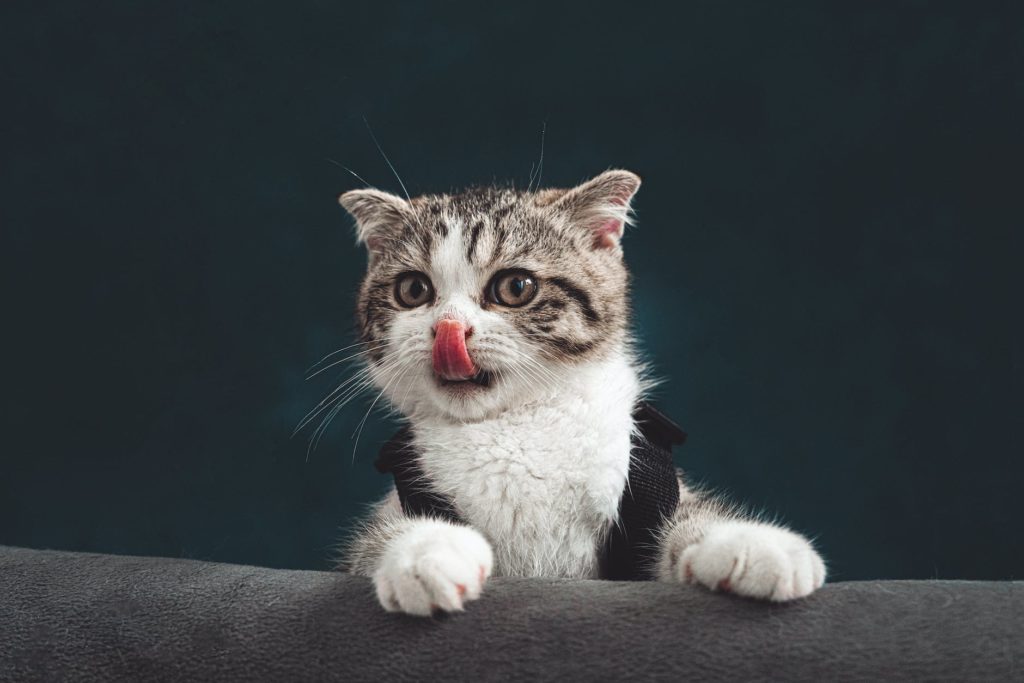Reasons Cats Lick, Chew, or Eat Human Hair
We all know cats are curious creatures, often drawn to the most peculiar things. One such quirk that leaves many cat owners baffled is their fascination with human hair. Whether it’s a gentle lick, a playful chew, or a concerning attempt to ingest, a cat’s interest in our locks can be both amusing and perplexing.

But what’s the reason behind this bizarre behavior? While the exact cause is often open to interpretation, several potential explanations can shed light on why your feline friend might be drawn to your luscious mane. Reasons Cats Lick. So, next time you catch your cat getting a little too close for comfort to your hair, consider these 14 possible reasons:
Table of Contents
1. Grooming and Bonding: More Than Just Cleanliness
Cats spend countless hours meticulously grooming their fur, licking and cleaning every inch with a dedication that borders on the obsessive. This behavior, however, is far from just a vanity project. In the feline world, grooming serves a crucial role in social bonding, strengthening the ties within their furry community.
When your feline companion gives you a bath with their sandpaper tongue, they’re not simply removing a stray hair or two. Reasons Cats Lick. It’s a gesture of acceptance, acknowledging you as part of their inner circle, worthy of the same meticulous attention they devote to themselves and their closest companions. It’s a sign of affection and trust, weaving you into their social fabric through the gentle strokes of their tongue.
This shared grooming ritual transcends mere cleanliness. It becomes a language of love, a silent communication that speaks of belonging and camaraderie. Reasons Cats Lick. As your cat meticulously grooms you, feel the connection deepen, the invisible thread binding you together grow stronger with each lick. It’s a bond built on mutual care, a testament to the unique social world of our feline friends.
2. Flavor and Texture: Why Your Hair Might Be a Delight to Your Cat
Believe it or not, your hair might be alluring to your feline friend for reasons beyond just affection. Your cat’s attraction could stem from its taste or its textural preferences.
Tempting Taste: Our hair, especially after a workout or a busy day, can accumulate a salty or even slightly sweet taste due to sweat and styling products. Reasons Cats Lick. This subtle flavor can be intriguing to some cats, especially those who are more adventurous with their culinary explorations. Additionally, remnants of food particles stuck in your hair after a meal could pique your cat’s interest, especially if they have a particular fondness for your culinary choices.
Texture Matters: The texture of your hair can also play a significant role in its appeal to your feline companion. Long, flowing strands can be particularly enticing, offering a satisfying sensation for them to chew or lick. The texture can be reminiscent of their favorite toys, triggering their playful instincts and encouraging them to engage with your hair in a playful manner.
Individual Preferences: It’s important to remember that every cat is an individual, and their preferences for hair can vary greatly. Reasons Cats Lick. Some cats may be completely indifferent to human hair, while others might be drawn to it with an almost obsessive enthusiasm. This individuality extends to their taste preferences as well, with some cats being more receptive to the salty or sweet notes in hair, while others might find the scent of food particles more enticing.
Understanding Your Cat’s Behavior: By observing your cat’s interaction with your hair, you can gain a better understanding of their motivations. Reasons Cats Lick. If they seem primarily interested in chewing or licking your hair, it’s likely a textural preference. However, if they exhibit a sniffing behavior before engaging with your hair, it might be the taste that’s attracting them.
If your cat’s fascination with your hair becomes excessive or bothersome, there are ways to encourage them to redirect their attention. Reasons Cats Lick. Providing them with engaging toys that mimic the texture of your hair, such as plush mice or feather wands, can help distract them from your mane. Additionally, ensuring they have regular playtime sessions can help fulfill their need for stimulation and reduce their interest in your hair.
Ultimately, understanding your cat’s individual preferences and motivations can help you manage their interaction with your hair and ensure a harmonious relationship with your feline friend.
3. Attention-Seeking: The Curious Case of Hair-Obsessed Felines
Cats, with their enigmatic personalities and curious habits, are masters at manipulating their humans. One intriguing way they often do this is by focusing their attention on our hair. Reasons Cats Lick. This obsession can manifest in various ways, from playful pawing and rubbing against our locks to outright hair chomping and pulling. But why do they do it?
The answer often lies in their desire for attention. Reasons Cats Lick. Cats are social creatures, and they crave interaction. If your feline friend notices that you react to their hair-related antics, they might learn to repeat it to elicit a response. Whether it’s a scolding, a playful swat, or simply some extra petting, they’ve succeeded in getting your focus – a reward in their eyes.
However, it’s important to distinguish between playful hair-play and destructive behaviors. If your cat is causing damage to your hair or furniture, it’s essential to address the underlying cause. Reasons Cats Lick. This could be boredom, anxiety, or even a medical issue.
Here are some ways to manage your cat’s hair obsession:
- Provide enriching toys and activities: Engage their natural instincts with interactive playtime and puzzle toys. A stimulated cat is less likely to seek attention through mischievous means.
- Set boundaries: If your cat’s hair-play becomes excessive, try redirecting their attention to another object or activity.
- Rule out medical issues: If the behavior is sudden or accompanied by other changes, consult your veterinarian.
By understanding the reason behind your cat’s hair fixation and implementing appropriate solutions, you can navigate this feline quirk and maintain a harmonious relationship with your furry friend.
4. Playful Exploration: Why Cats Love Your Hair
Cats are born explorers, driven by an insatiable curiosity and a love for play. Your hair, with its unique texture and movement, becomes just another irresistible object for them to investigate. Reasons Cats Lick. The sensation of licking, chewing, or batting at your hair, especially when it’s flowing or dangling enticingly, triggers their playful instincts.
Your hair might also hold intriguing scents, attracting your feline friend to investigate further. Reasons Cats Lick. Perhaps it carries the aroma of your recent meal, a touch of your favorite perfume, or even the lingering scent of another animal encountered on your adventures.
This playful exploration provides not only entertainment for your cat but also serves as a bonding experience between you two.
5. Stress and Anxiety Relief
Self-grooming in cats is a vital behavior that goes beyond mere cleanliness. It releases endorphins, those feel-good chemicals in the brain, creating a sense of calm and well-being. Reasons Cats Lick. However, when stress or anxiety creeps in, your feline friend might take this self-soothing behavior a step further. They might resort to licking, chewing, or even eating your hair as a way to find comfort and manage their emotional state.
This behavior can be concerning, especially if your cat shows other signs of stress like excessive meowing, changes in appetite or litterbox habits, or withdrawn behavior. Understanding the root cause of their anxiety is key to addressing the issue effectively.
Changes in your cat’s routine, a new pet in the household, or even loud noises from construction outside can all contribute to their stress levels. Reasons Cats Lick. Once you identify the triggers, you can take steps to create a more calming environment for your furry friend. Providing them with plenty of interactive toys, regular playtime, and cozy hiding spots can help them feel more secure and less overwhelmed.
If your cat continues to display excessive grooming or other worrisome behaviors, consulting with a veterinarian is crucial. They can rule out any underlying medical conditions and offer additional guidance on managing your cat’s anxiety. Reasons Cats Lick. Remember, with patience, understanding, and the right strategies, you can help your feline companion find their inner peace and regain their happy, playful self.
6. Nutritional Deficiency: A Possible Cause for Hair-Eating in Cats
While uncommon, hair-eating behavior in cats can sometimes signal a nutritional deficiency. Reasons Cats Lick. If your feline friend exhibits this behavior, it’s crucial to rule out any underlying medical concerns.
A lack of essential fatty acids or minerals can trigger this behavior. Essential fatty acids, like omega-3s and omega-6s, play a vital role in maintaining healthy skin and coat. Reasons Cats Lick. Deficiencies in these nutrients can lead to dry, itchy skin, prompting your cat to lick and groom excessively, potentially ingesting hair in the process.
Similarly, mineral deficiencies, particularly zinc and iron, can also contribute to hair-eating. Reasons Cats Lick. These minerals are crucial for healthy hair growth and overall well-being. When deficient, cats may resort to licking and chewing their fur, leading to hair ingestion.
If you suspect a nutritional deficiency, consulting your veterinarian is crucial. They can perform a thorough examination and conduct necessary tests to identify the specific deficiency and recommend the appropriate dietary adjustments. Reasons Cats Lick. Addressing the underlying nutritional need may effectively curb your cat’s hair-eating behavior and bring back that healthy, beautiful coat.
7. Pica: When Cats Develop a Taste for the Unexpected
Pica, a behavioral condition in cats, manifests in the persistent consumption of non-food items. While hair often tops the list of unusual cravings, cats with pica might also find themselves drawn to paper, plastic, fabric, or even dirt. Although not always detrimental, pica can signal underlying issues such as stress, anxiety, or nutritional deficiencies.
Observing your cat for other behavioral changes alongside pica is crucial. Reasons Cats Lick. Lethargy, decreased appetite, and changes in litter box habits could indicate a more serious problem. Consulting a veterinarian or animal behaviorist becomes essential if your feline friend displays pica symptoms. They can help identify the root cause of this behavior and recommend appropriate solutions, ensuring your cat receives the necessary care and support.
8. Boredom and Lack of Stimulation: Why Your Cat Might be Obsessed with Your Hair
Boredom and lack of stimulation can lead to a variety of unwanted behaviors in cats, including excessive grooming and the irresistible urge to play with your strands of hair. Reasons Cats Lick. If your cat seems fixated on your hair, it’s essential to consider their overall level of enrichment and how you can provide more stimulating activities.
Addressing boredom involves creating a stimulating and engaging environment for your feline friend. Offer an array of interactive toys, like puzzle feeders or feathered wands, to encourage their natural hunting instincts. Provide climbing structures and scratching posts to satisfy their need to climb, explore, and exercise. Reasons Cats Lick. Engage your cat in regular playtime sessions to expend their energy, stimulate their minds, and strengthen your bond.
By providing your cat with ample physical and mental challenges, you can significantly reduce boredom-driven behaviors, including those involving your precious hair. Reasons Cats Lick. Remember, a tired cat is less likely to seek out mischievous activities and more likely to curl up for a peaceful nap.
9. Medical Causes for Pica in Cats: When to See the Veterinarian
While pica behavior in cats can sometimes be a harmless quirk, it’s important to rule out any underlying medical causes that might be driving this unusual eating habit. Reasons Cats Lick. Several medical conditions and parasites can lead to pica in cats. These include:
- Gastrointestinal issues: Inflammatory bowel disease, malabsorption syndromes, and intestinal parasites can all contribute to pica as the body seeks to compensate for nutrient deficiencies.
- Neurological disorders: Conditions affecting the brain, like feline cognitive decline or head injuries, can alter a cat’s behavior, leading to pica.
- Nutritional deficiencies: A diet deficient in essential nutrients like vitamins or minerals can trigger a cat’s desire to ingest non-food items.
- Dental problems: Painful teeth or gum disease may lead cats to chew on unusual textures in an attempt to soothe discomfort.
- Parasites: Internal parasites, such as roundworms or tapeworms, can cause pica as they compete with the body for nutrients and irritate the digestive tract.
If you suspect any medical reasons behind your cat’s pica, a trip to the veterinarian is crucial. They will perform a thorough examination, including blood work and fecal analysis, to diagnose any underlying health issues and provide appropriate treatment. Reasons Cats Lick. Remember, addressing the medical cause of pica is essential to stop this behavior and ensure the overall well-being of your feline friend.
10. Environmental Factors and Hair-Related Behaviors in Cats
Environmental changes can significantly impact your cat’s stress levels and trigger unusual hair-related behaviors. Introducing a new pet, moving to a different home, or even renovations can create anxiety for your feline friend. Reasons Cats Lick. These changes disrupt their familiar routine and sense of security.
To help your cat cope with these challenges, it’s crucial to provide a safe and calming space. Designate a quiet area with their favorite toys, bed, and scratching post. Make sure they have access to hiding places where they can retreat and feel secure. Reasons Cats Lick. Additionally, showering your cat with extra attention and affection will reassure them and strengthen your bond. By creating a supportive and understanding environment, you can help your cat adjust to the changes and minimize the stress-induced behaviors.
11. Impacted Hairballs: When Your Cat’s Grooming Habit Turns Problematic
Hairballs are a common occurrence for cats, formed from ingested fur during their meticulous self-grooming. Reasons Cats Lick. While coughing them up once in a while is normal, excessive licking of your hair followed by hairball expulsion could indicate a more significant problem.
Cats lack certain enzymes needed to break down hair, causing it to accumulate in their stomachs. Reasons Cats Lick. This can lead to the formation of large, hard hairballs that are difficult to pass, causing discomfort and potentially leading to intestinal blockage.
If you observe your cat frequently licking your hair and coughing up hairballs, a trip to the vet is crucial. Reasons Cats Lick. They can assess the severity of the issue, identify any underlying causes, and recommend appropriate solutions, be it dietary changes, hairball remedies or in severe cases, surgical intervention.
Remember, monitoring your cat’s grooming habits and hairball frequency can help identify potential problems early and ensure their continued health and wellbeing.
12. Social Interaction and Communication
Cats are masters of nonverbal communication, using their bodies and behaviors to convey messages to both their feline and human companions. Reasons Cats Lick. One common way cats initiate interaction or express affection is through licking, chewing, or even eating your hair. This seemingly odd behavior is often accompanied by purring, kneading with their paws, and rubbing their heads against you, all of which are signs of contentment and social bonding.
Beyond grooming, cats communicate through a variety of vocalizations, including meows, purrs, chirps, and even growls. Each sound carries a specific meaning, from a simple greeting to a request for food or attention. Reasons Cats Lick. Understanding these vocal cues can help you better understand your cat’s needs and strengthen your bond with them.
13. Learned Behavior
If your cat witnessed another cat in their household or community exhibiting hair-related behavior, they might have learned it through observation and mimicry. Reasons Cats Lick. This is especially common in multi-cat households where felines share close quarters and observe each other’s routines. Observing another cat licking their fur excessively could trigger your own cat to do the same, potentially developing an unhealthy habit. Consider whether your cat’s behavior might be influenced by the actions of another feline in their environment.
14. Learned Behavior
If your cat witnessed another cat in their household or community exhibiting hair-related behavior, they might have learned it through observation and mimicry. Reasons Cats Lick. This is especially common in multi-cat households where felines share close quarters and observe each other’s routines. Observing another cat licking their fur excessively could trigger your own cat to do the same, potentially developing an unhealthy habit. Consider whether your cat’s behavior might be influenced by the actions of another feline in their environment.
While understanding the reasons behind your cat’s hair-related behavior can be beneficial, it’s important to remember that it’s not always a harmless act. Ingesting hair can lead to digestive problems and hairball formation. If you’re concerned about your cat’s hair-eating habits, consult your veterinarian for advice and potential solutions.
Cats Lick
As cat owners, we often find ourselves perplexed by our feline friends’ odd behaviors, such as their fascination with our hair. Many cats have a habit of licking, chewing, or even eating human hair, which can be concerning for their owners. In this article, we’ll explore the reasons why cats exhibit this behavior and what it means for their health.
Reasons Why Cats Lick, Chew, or Eat Human Hair
1. Grooming Instincts
Cats are known for their grooming habits, and licking their owners’ hair is simply an extension of this instinct. When cats groom themselves, they use their tongues to remove dirt and debris from their fur, which also helps them cool down. When they lick human hair, they may be trying to groom their owners as they would another cat. This behavior can also be a sign of affection.
2. Nutritional Deficiencies
Cats require certain nutrients, such as protein and fiber, to maintain their health. Some cats may seek out human hair as a source of these nutrients, which can be a sign of a nutritional deficiency. If your cat is eating large amounts of hair or other non-food items, it’s important to speak with your veterinarian about their diet and potential nutritional deficiencies.

3. Stress or Anxiety
Cats are sensitive creatures and can become stressed or anxious in certain situations. This can lead to obsessive behaviors, such as licking or chewing on human hair. If your cat is exhibiting these behaviors, it’s important to identify and address the root cause of their stress.
4. Medical Issues
In some cases, cats may lick or chew on human hair due to medical issues such as gastrointestinal problems or dental issues. If you notice that your cat is exhibiting this behavior frequently, it’s important to bring them to the veterinarian for a check-up.
Live Pee Free! Odor Eliminator 100% Eliminates Pet Odor on Contact. 20% Off. No Enzymes, No Fragrance, No Detergent, No Bleach – Safe for Kids and Pets.What Should You Do If Your Cat is Licking, Chewing, or Eating Human Hair?
If your cat is exhibiting this behavior, it’s important to take action to prevent any potential health issues. Here are a few steps you can take:
1. Keep Your Hair Tied Back
One simple solution is to keep your hair tied back or covered with a hat or scarf. This can prevent your cat from accessing your hair and potentially ingesting it.
2. Provide Appropriate Toys
Providing your cat with appropriate toys and activities can help alleviate stress and anxiety. Interactive toys, such as puzzle feeders or laser pointers, can help keep your cat entertained and mentally stimulated.
3. Consult with Your Veterinarian
If your cat is exhibiting obsessive behaviors, it’s important to speak with your veterinarian. They can help identify any potential medical issues and provide recommendations for addressing any underlying stress or anxiety.
Conclusion
Cats are fascinating creatures, and their behaviors can sometimes be difficult to understand. While it may seem odd that cats are drawn to human hair, it’s important to remember that this behavior can have underlying causes. By understanding why cats exhibit this behavior, you can take steps to prevent any potential health issues and keep your cat happy and healthy.




